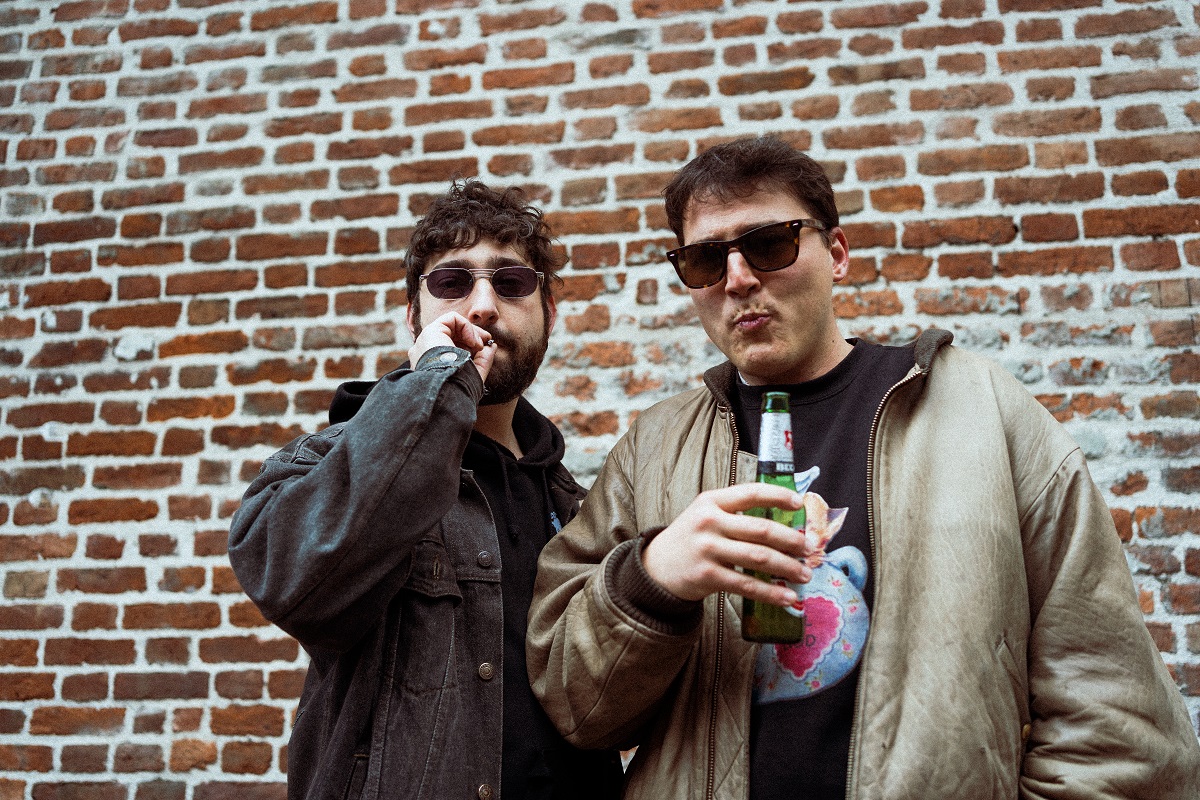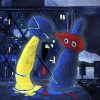Interview by Francesca Marchesini
On August 24, the band Brucherò nei pascoli will pass through Via Padova (Milan) to finally arrive in Parco Raggio to perform a live show full of crossover music, punk attitude, and screwing around. The duo is made up of Davide Perego and Stefano Rettura; as of now, they have two EPs under their belt – Bar Adriana (Pioggia Rossa Dischi, 2022) and Ghicci Ghicci (Woodworm, 2023) – and have received extremely positive feedback compared to that of their performances of the last few years at MiAmi. Looking forward to their concert in Pontenure, the Asino Vola editorial staff has asked Brucherò nei pascoli some questions regarding their journey in the music industry and their obvious passion for cinema.
“We like to show their most bizarre and humiliating aspects of life, but we’ve got a lot of respect for it.”
How did Brucherò nei pascoli come to be?
Stefano: It came to be through meeting lots of people and when the stars unexpectedly aligned. Davide and I have known each other for a long time, and we’ve been writing songs since we were young. We’ve released a lot of self-produced rap albums over the years. Then we met Niccolò, a friend of Davide’s from high school, in 2020. We started working with him in his recording studio near Loreto (Marche). This encounter was a game changer for us: from Bar Adriana on, we introduced horns, percussion instruments, and keyboards, all played by musicians that are now part of our live shows. Our family has grown, and the project has a more multifaceted musical identity than before.
Davide: Right, all of that is true. It always seems so funny to me how neither I nor Stefano can play any instrument. We’re in charge of coming up with ideas for songs, lyrics as well as tunes… then Nic and the others make everything work.
When your first EP, Bar Adriana, came out, you were praised (like on the April 2023 cover of the Rolling Stone) but also put under pressure. How do you deal with music critics? And what’s your relationship with the audience?
Davide: I wouldn’t say we’re being put under pressure; we don’t really worry about it… the cover you’re referring to is a group photo including several artists, we aren’t that important yet! Anyway, we’re very curious to find out what they’re writing about us. First of all, because it’s a privilege to have people take an interest in you and in what you do. Also, when you make music or anything else that you feel such a visceral connection with, you always believe that other people will feel the same way as you about it, but it’s never like that. We would be lying if we said that external opinions don’t influence us, but we’re also confident enough to put together stuff that we like and not stuff that only others would like. It is important to listen to criticism, and it’s getting harder and harder to find journalists that express negative opinions on something or that highlight its flaws. Nowadays, everyone does nothing but praise, almost as if they were scared or excessively passionate, maybe due to the crisis in the field.
Stefano: We believe the audience follows and loves us, especially for being spontaneous and provocative. However, we have a lot more to show, and we will do that over time, but with no rush.
Scema, Morale, Palle piene: they’re all tracks for those who are fed up with people and life, and they certainly aren’t lacking in sarcasm…
Davide: No, we’re neither fed up with life nor with people. If anything, they’re the two main sources for our songs. We like to show their most bizarre and humiliating aspects, but we’ve got a lot of respect for them. In that sense, we’ve taken inspiration from cynical singer-songwriters like Paolo Conte and Piero Ciampi. They, too, tell us stories of “desperate lives” while simultaneously feeling part of them. When talking about someone close to you, you need to be empathetic. Then, of course, sarcasm is a way to make what would normally be taboo accessible. That’s how satire works. We believe in freedom of expression, and if it screws someone over, even better… that means it’s striking a nerve. We’ve often been labeled misogynistic for our lyrics. What people don’t get, however, is that being controversial is useful both to point fingers and to push a discussion about those uncomfortable topics.
Stefano: As Davide said, as much as our worldview might appear negative or pessimistic, it always entails a glimmer of hope. All the people that we take inspiration from and that we try to describe, despite being exhausted or frustrated because of some issues in their daily lives and life in general, somehow never give up hope. Satire and sarcasm are ways to tackle difficult and uncomfortable topics, without giving too much weight to what is already hard to accept. We’ve always liked comic books such as Il Male and all the politically incorrect satire from the 70s.
“As much as our worldview might appear negative or pessimistic, it always entails a glimmer of hope.”

What is the song that better represents you? And what can’t you wait to play on the Concorto Film Festival stage?
Stefano: I’m always thrilled to sing Ghicci Ghicci, the title track of our new EP. I think that every song represents a bit of us. This one, though, is almost like a motto for the band. «Evridei, evrinait, yu know we fight, and yu can try!» (editor’s note, the butchered English is a way to mock Måneskin).
Davide: While on tour, in addition to the tracks that have already been released, we play some original songs that we will put out in autumn. They’re probably my favorite to play.
In your duo, Davide is also in charge of making video clips. Why did you choose to work on it yourself?
Davide: Because I’ve been working in the film industry for a few years, and I run a small production company called Tafano. We organize shows and events in Milan. Normally, almost every video originates from a few common ideas, like in Ghicci Ghicci. That time, it was an event we witnessed together: a naked man walking on the Maspalomas beach jumped into the ocean, yelling like a madman at the huge waves that were coming towards him. We were there to work on our record, and we all immediately realized he would be the perfect character for the video clip of our new single. Also, except for our first video clip Bar Adriana, Stefano and I don’t want to be part of them. Like in our songs, we want other people’s stories to be the focus. That’s why we always try to come up with ideas that are as far from the track as possible and put in a play of contrasts. For instance, in Morale, we chose little Marco as the main character; in Immenso, the volleyball players. Generally, we prefer working with non-professional actors; it’s way more stimulating and fills our work with life.
Stefano, how involved are you in making the videos?
Stefano: My only contribution was being punched in the face in the Scema video clip. A real punch. Since it was a long take and Davide is strong on realism, I got hit more than ten times. Fuck him and fuck film d’auteur.
Speaking of cinema, what’s your favorite film? And the short film you have at heart?
Davide: I think I speak for both of us when I say Marco Ferreri as a director has made us a lot closer. La Grande Bouffe (La grande abbuffata) is a film that really represents our style as a band. It’s about male friendship but without any clichés, and it’s the death of every symbol of capitalism and the patriarchy. In an interview, I believe Ferreri said “My films are always about men and women”. We always start from there too and go on uncensored.
Stefano: I’m not really your typical “movie lover”, but if I had to talk about my favorite movie, as for shots and soundtrack, I would undoubtedly choose Fellini’s Casanova. I haven’t seen a lot of short films, but I really dig Marco Proserpio and Cane Morto’s self-produced works.
Before participating as guests, had you already heard of Concorto Film Festival?
Davide: Of course! I even reviewed the films once, but remotely; I’ve never had the chance to actually go there. I can’t wait to watch horror movies in the greenhouse at night!
Is there a movie soundtrack you’d like to change completely if you were to work on it as music supervisor? What tracks would you choose?
Stefano: That’s a difficult question… Completely changing already existing soundtracks isn’t really my thing, but if I could, I’d like to work on Akira by Katsuhiro Ōtomo. It’s a very eventful anime while also encouraging the audience to think.
Davide: Last year, the satirical video-making group “Il terzo segreto di Satira” used one of our songs in their film. In general, we would like to compose music for films. Nic (editor’s note, Niccolò, producer of the band) and I met again after a few years to work on the soundtrack of a movie I had shot. From then on, we’ve never stopped working together.







Commenti recenti